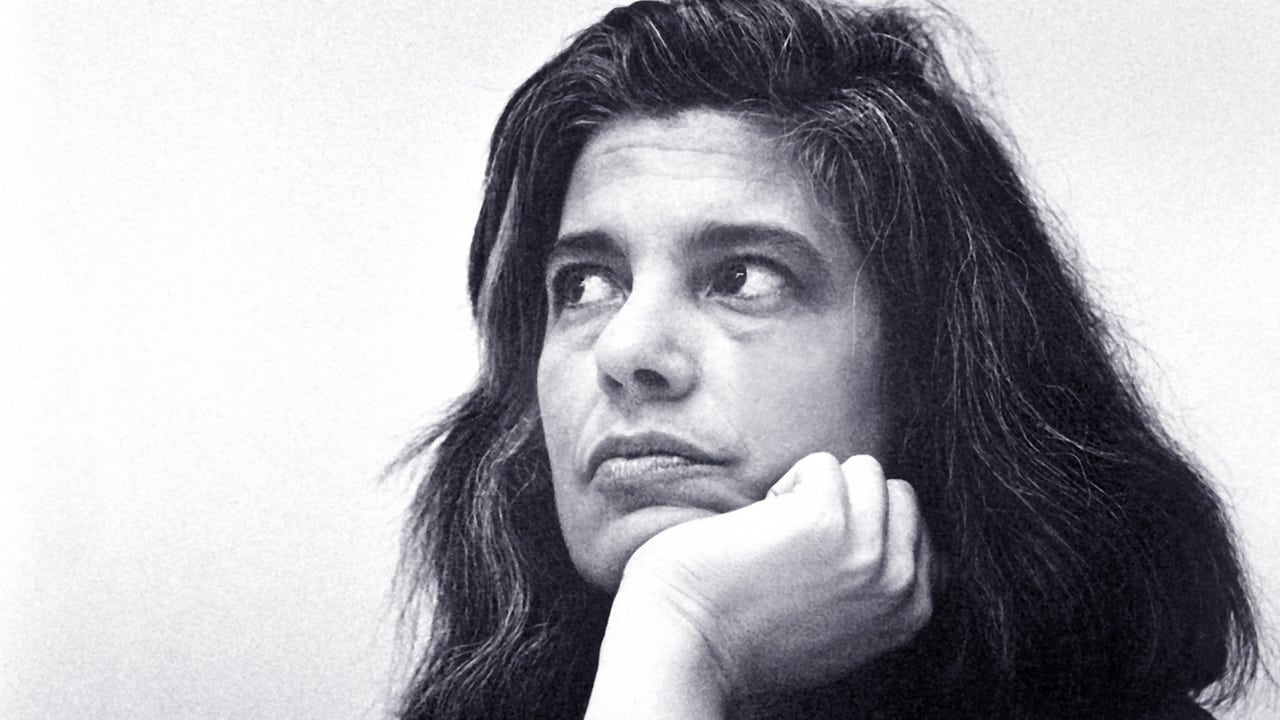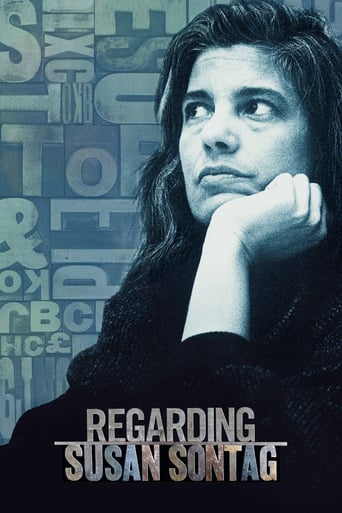



hyped garbage
Fun premise, good actors, bad writing. This film seemed to have potential at the beginning but it quickly devolves into a trite action film. Ultimately it's very boring.
View MoreExactly the movie you think it is, but not the movie you want it to be.
View MoreThe joyful confection is coated in a sparkly gloss, bright enough to gleam from the darkest, most cynical corners.
View MoreSusan Sontag is one of those names that always seemed to come up in conversations about the so-called "intellectual elite" along with the "effete snobs", "chattering classes", etc. In the cultural divide between us vs. them, she was always in the "them" category. My impression is that in any open society that upholds free thought, it is important to put out new and different points of view in the marketplace of ideas. We have nothing to fear from the free expression of thoughts and ideas. In this documentary, we find out about the life of Susan Sontag, born Suan Rosenblatt. We meet her sister, and her son and daughter in law and her partners, including photographer Annie Leibovitz. Viewers see photos of her parents who lived in China until she was five while Susan and her sister remained in the United States. After the death of her father, her mother returned home and married a Sontag, the name that remained hers. She spent her adulthood mainly in Paris and New York. She fought three battles against cancer and won the first two, finally succumbing in 2004 at age 71. She wrote about her experience with cancer and tried everything in her power to fight it. In the 1960's, Sontag was a critic of the Vietnam War and a leader of the women's movement. In a discussion with Noman Mailer, Susan Sontag asked why it was necessary to use gender labels like "women writers" or "women doctors"...why aren't they simply called doctors or writers as men are. Thankfully, those labels are no longer used. I thought her ideas about photography were compelling, particularly her point that once a person passes, the photograph becomes what we remember and how we recall them. In the 1960's shock photographs became more commonplace, especially in magazines such as Life. Sontag felt that the more shock photos people see, the less impact they had. I found Susan Sontag to be an excellent subject and very well spoken. She seemed very comfortable and courteous with interviewers and despite her reputation for complex ideas, she expressed herself with great clarity as she responded to questions. This is a documentary well worth viewing.
View MoreHere's a quote from this vile woman that is celebrated as some sort of genius intellectual: "The white race is the cancer of human history; it is the white race and it alone—its ideologies and inventions—which eradicates autonomous civilizations wherever it spreads, which has upset the ecological balance of the planet, which now threatens the very existence of life itself." The fact that she can get away with saying this and people have no issue with this statement goes to show the cognitive dissonance and delusion that permeates Western society. Could you imagine a statement like this being made by a white person about any other group and nobody having a problem with it? Sontag exemplifies everything that is wrong with leftist movements. They claim to be all about equality and egalitarianism and yet they take every opportunity they get to slander, denigrate and abuse white people. Despite the claims they make about their opponents, they themselves are hateful bigots projecting their own pathologies onto anyone that isn't like them or disagrees with their opinions. Susan Sontag is burning in hell and I couldn't be happier about that.
View MoreAmerican screenwriter, producer and director Nancy Kates' documentary feature which she wrote with film editor John Haptas and produced, is inspired by the life of a renowned 20th and 21st century author, lecturer, editor, journalist, philosopher, playwright and filmmaker. It premiered in the USA, was shot on locations in America and is a U.S. production. It tells the story about an American citizen born in Manhattan, New York City, USA into "The Great Depression" (1929-1939), during the building of the Golden Gate Bridge and presidency of American politician and 32nd president of the United States of America named Franklin D. Roosevelt (1882-1945), a century after a U.S. author named Louisa May Alcott (1832-1888) and given the name Susan Rosenblatt. She was raised by relatives on Great Neck, Long Island in the state of New York in the Unites States, her then twenty-eight-year-old father of Austrian-Jewish ancestry named Jack Rosenblatt and her twenty-six-year-old mother of Russian-Jewish ancestry named Mildred Jacobson ran a fur trading business in China, and as a three-year-old she got a sister named Judith and began reading. After beginning her elementary education, having lived in New Jersey and in Miami, USA and experienced her first asthma incidence as a five-year-old, she relocated to Tucson, Arizona, USA with her sister and mother where she continued her training at public schools as a six-year-old and began her practice of the art of writing and personification of Susan Sontag.Distinctly and precisely directed by American filmmaker Nancy Kates, this quietly paced documentary which is narrated by American actress Patricia Clarkson and from multiple viewpoints, draws a poetic and lingering portrayal of an inquisitive, well-read, widely traveled, significant, patriotic and internally ingrained thinker nicknamed "Sue" who in the late 1930s declared that she would achieve the Nobel Prize, in the 1940s dug a hole like a grave in her backyard where she sat alone, moved to Southern California, USA, got her surname Sontag, entered North Hollywood High School, began learning philosophy, read the diaries of a French author named Andre Gidé (1869-1951) and created personal records regarding . While notable for its versatile and atmospheric milieu depictions and reverent cinematography by cinematographer Sophie Constantinou, this narrative-driven story regards the life, authorship and personality of a dedicated writer of prefaces, journals, essays, diaries, novels, plays and screenplays whom whilst studying at the University of Colombia in the late 1940s after temporarily attending the University of California, Berkeley as a scholar where she befriended an American author named Harriet Sohmers Zwerling, encountered an American filmmaker named Mike Nichols (1931-2014), as a seventeen-year-old at the University of Chicago familiarized an American sociologist named Philip Rieff (1922-2006), in the early 1950s after gaining her Bachelor of Arts as a nineteen-year-old, gave birth to a son named David Rieff and started her studies at the Harvard University and as a mother and wife in her early twenties in the United States achieved her Master's degree in both English and Philosophy. With informative interviews of family members, friends, writers, literature critics, teachers, scholars and filmmakers, this cinematographically interpretative remembrance of an eloquent, praised, criticized, adversary, precocious, itinerant, transcending and auto-didactic reader, anti-segregationist, cultural critic and person of letters driven by admiration whom before realizing her vocation was an aspiring chemist and physician, in the mid-1950s as a twenty-two-year-old became a student at the University of Oxford in Oxfordshire, England, in the late 1950s after receiving a scholarship and going to France to study at the Paris-Sorbonne University observed a French novelist, performed a walk-on in a French New Wave film, witnessed the debut of her first book written with her then husband and met a Cuban-American playwright and director named Maria Irene Fornés, in the early 1960s in New York City, USA became a teacher, conducted lectures at Sarah Lawrence College of Libertarian Arts, The City College of New York, Colombia University and Saint Anne's College in Oxford, England where she had classes with an English author and philosopher named Iris Murdoch (1919-1999) and joined the antiwar movement, as a thirty-three-year-old got her introducing novel published by an American book publishing company called Farrar, Straus & Giroux, the year after decided to become a freelancer and got her central short essay called "Notes on Camp" (1964) released and in the late 1960s was a jury member at the 28th Venice Film Festival in 1967, traveled to Hanoi, Vietnam and made her feature film debut, contains a great and timely score by composers Laura Karpman and Nora Kroll-Rosenbaum. This biographical, historic and naturally humorous testimony of real events in the life of a daughter who in the early 1970s got the rights from a French 20th century author to adapt her debut novel, made a documentary feature, met a French actress, producer and director named Nicole Stéphane (1923-2007) and learned she had a year left to live, in the 1980s acquainted an American photographer named Annie Leibovitz, in her sixties went to Bosnia and Herzegovina and was named Commandeur De I 'Ordre Des Arts et Des Lettres by the government of France, in the late 2000s got her final novel published, was presented with the Jerusalem Prize for the Freedom of the Individual in Society, took piano lessons, returned to France six years before a Norwegian musician named Susanne sang the words: "There are echoes in the garden ", eight years after the passing of a once stateless Russian-American poet named Joseph Brodsky (1940-1996), more than a century after the inauguration of the Statue of Liberty and the birth of a U.S. 19th century poet called the New England mystic who wrote a poem called "To own a Susan of my own" and who as a four-year-old human being with a name signifying a lily was in a park with her Irish nanny, is impelled and reinforced by its fragmented narrative structure, rhythmic continuity, archival footage, photographs and scenes with A sincerely venerable documentary feature.
View MoreI saw this film at the SF Gay Film Festival 2014. This documentary has inspired me to read more of Susan Sontag's writings. I had read a couple of her early works years ago and had not realized how much more she wrote. The film does a beautiful job of unfolding her life story and interweaving the subjects of her writings and work as an activist. It was an intriguing tale with gorgeous photographs and lots of great interviews with family members, friends, and lovers. By the end of the film, I felt like I had been given a taste of Susan which lingered on the tongue and wanted more. She seemed to be one of those intensely private yet public characters who we think we know but actually don't know at all. This was a fascinating portrait of an extremely intelligent woman who lived life on her own terms. She demonstrated what it means to be nonconformist and live with the consequences of actions disapproved by others. The director is to be commended for achieving the monumental task of finding critical clips of historical archival footage, getting access to and interviews with the important people in her life, and putting the pieces together in a nonjudgmental way that respects the varying perspectives of all the people involved.
View More